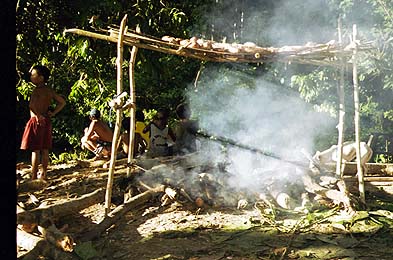 |
Ikat Forum Australia Dana's Textile Travels India Guest traveller | China
Longhouse field trip
 |

Most boats took 4 passengers and required 2 crew, one to man the motor and one to stand, observing submerges rocks and shallows. |
The
opportunity for a three day field trip, up river in longboats, staying
at Naga Sumpa longhouse and viewing traditional dyeing processes as
well as weaving and mat making was too good not to take up.
We traveled by bus to the Malaysian Handicraft Development centre,
Betong, viewing a variety of textiles being created. Batik is a popular
technique with quite distinctive differences from the Indonesian style.
The designs are free flowing using brushwork within a tjanting outline.
Weaving and spinning were also being demonstrated. Then on to the
Batang-Ai Hydro-Dam where we transferred to longboats for the trip
up river. All hand luggage was required to be waterproof, which we
had hoped was only a precaution. We did have to get out and help push
the boats through the shallows and rapids, with only our footwear
getting wet. The lush jungle vegetation with occasional longhouse
and pepper plantation breaking the solitude made the trip a magical
journey. |
|
It was interesting to arrive and see how longhouses compare to an apartment block. Each family has it's own private living quarters, preparing their own food, but sharing a communal social area the entire length of the building. This area was used for musical entertainment one night and also for displays and demonstrations of weaving, pot making, and mat weaving. |
Naga Sumpa Longhouse |
|
Adding final ingredients before submerging the yarn. |
The
big event the second day was the ceremony of treating the cotton yarn
with mordant so it would accept the vegetable dye. This ceremony has
ritualistic traditions involving offerings, songs, dances, and
was called "women's warpath". The skilled master dyer, deriving
knowledge in dreaming was regarded equally with the victorious
male warrior. The process was long and arduous requiring many ingredients
and careful stomping of the yarn in the special trough with the woman's
feet. These time consuming traditional dyeing processes are being
replaced in many areas by chemical dyes due to the time saving factor.
However the special exhibitions and competitions held by Ateilier
Sarawak are encouraging the weavers to value and continue with their
traditions. |
|
|
|
|
|
 fish smoking over the fire |